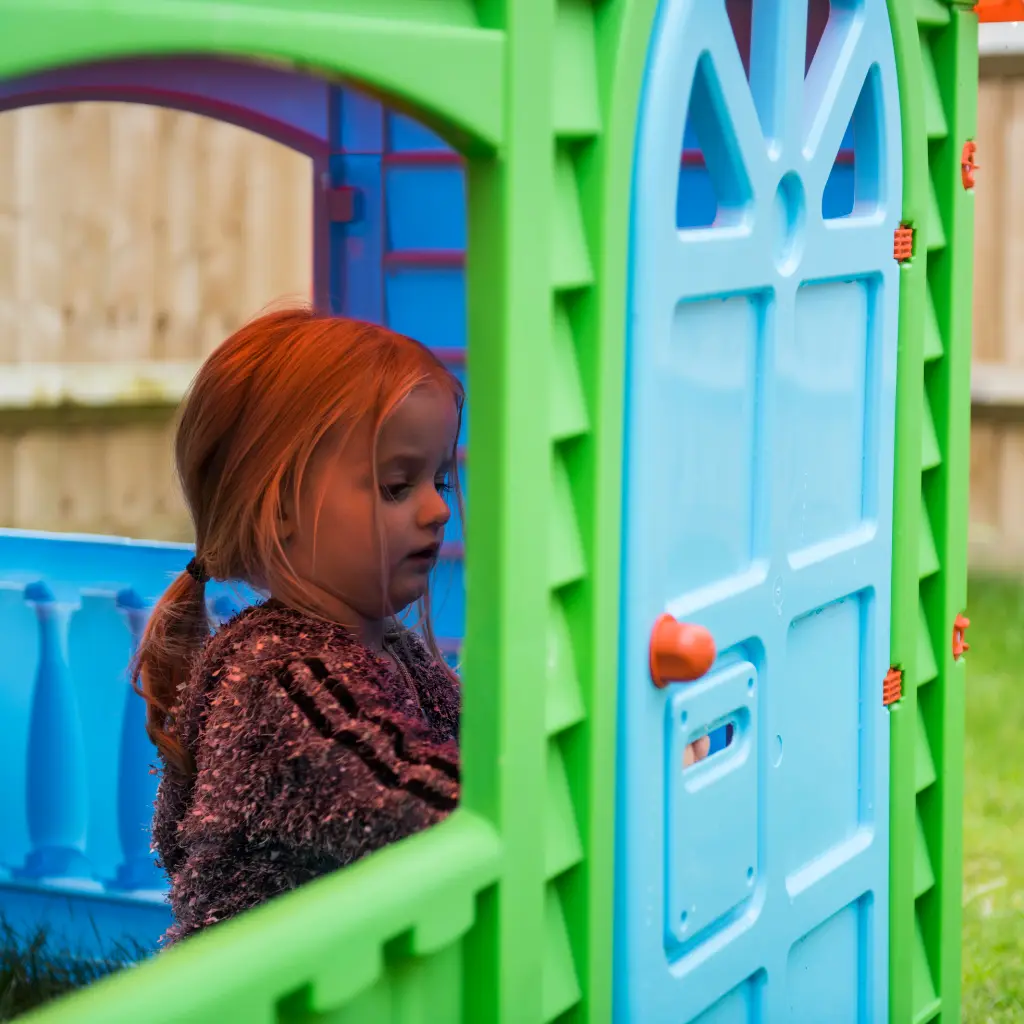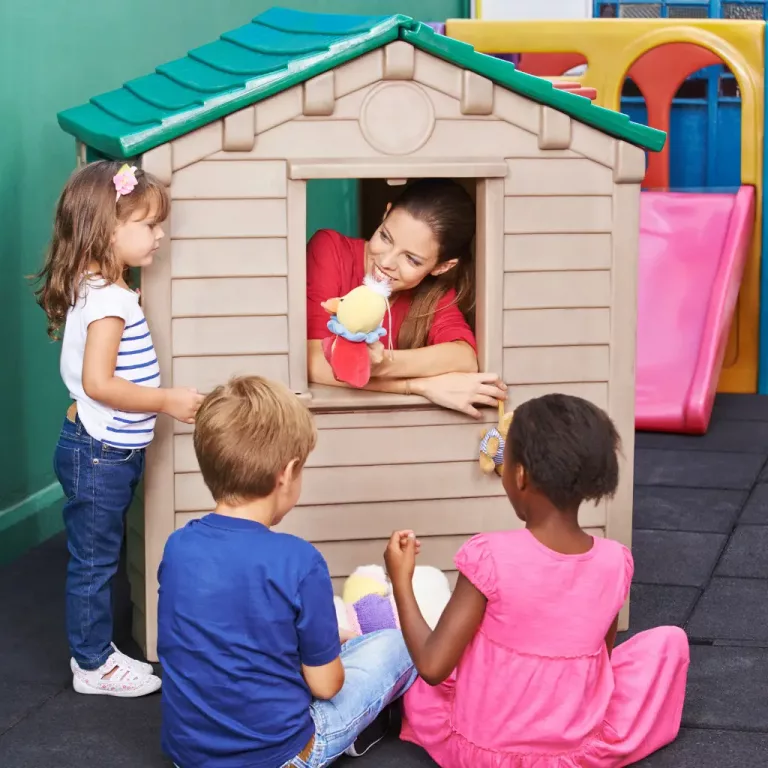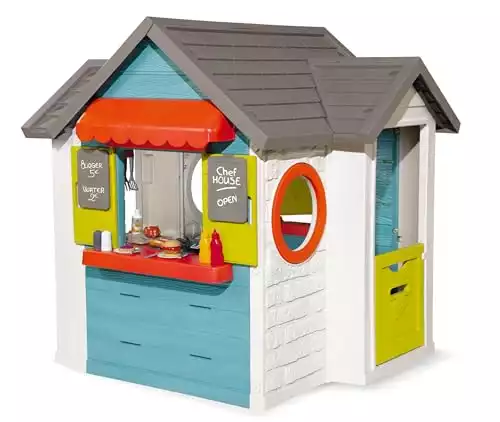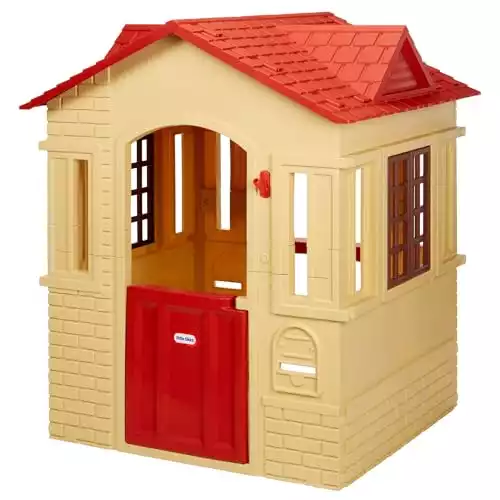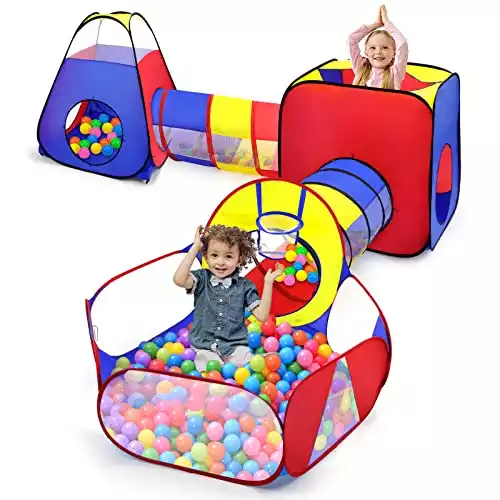It’s easy to overlook the simple things that bring immense joy and numerous benefits to our children.
One such treasure?
Playhouses (sometimes referred to as Wendy Houses).
Imagine a world where the simplest structure—a playhouse—can unlock a treasure trove of developmental benefits for children.
These aren’t just any ordinary play spaces; they’re incubators for growth, learning, and exploration.
The significance of such play environments is underscored by the booming indoor playground industry in the UK, which is experiencing significant growth.
The market size is projected to reach $2,723.37 million by 2031, up from $857.64 million in 2021. This substantial increase highlights not just a market trend but a growing recognition of the value of play in child development.
Play, in its purest form, is not just an activity but a vital part of a child’s development. It’s where the magic of learning meets the joy of childhood.
Let’s take a look into why these quaint little structures are more than just a playground accessory—they’re a cornerstone in children’s developmental journey.
Table of Contents
TogglePhysical Development
Encouraging Physical Activity and Gross Motor Skills Development
When children clamber up ladders, whoosh down slides, or navigate the complex interiors of a playhouse, they’re not just burning off extra energy.
They’re sculpting their physical abilities, honing gross motor skills, and laying the groundwork for a healthy lifestyle.
This kind of active play is crucial for developing strength, flexibility, and coordination.
Every time they reach for the next rung on a ladder or balance their way across a narrow beam, they’re engaging muscle groups and learning to control their movements with precision.
Benefits of Climbing, Sliding, Crawling, and Running in Playhouses
Climbing strengthens the arms, legs, and core, enhancing overall body strength and agility. Sliding requires balance and teaches children about gravity and spatial orientation, preparing them for more complex physical activities as they grow.
Crawling, often overlooked, is fantastic for cross-body coordination, essential for cognitive development and physical balance.
Running, whether it’s chasing friends in tag or dashing from one part of the playhouse to another, boosts cardiovascular health and stamina.
Together, these activities offer a holistic workout that’s both enjoyable and beneficial, encouraging children to challenge their limits in a safe environment.
|
5.0
|
4.8
|
4.9
|
|
£310.00
|
£129.99
|
£49.99
|
Importance of Physical Play for Overall Health and Well-being
Where screen time often eclipses outdoor play, the physical engagement offered by playhouses is more vital than ever.
Engaging in physical play outside allows children to soak up essential vitamin D from sunlight, which is crucial for bone health and immune function.
The fresh air they breathe while playing outdoors improves lung health and can even enhance mood and mental focus.
Moreover, the active, hands-on nature of playhouse activities fosters a healthy lifestyle from an early age, setting children up for a lifetime of physical activity and well-being.
Encouraging children to spend time in playhouses not only promotes their physical development but also contributes to their overall health, helping to counteract the sedentary lifestyle that is becoming increasingly common in today’s youth..
Cognitive Development
Stimulating Imagination and Creative Thinking
Playhouses serve as the canvas for the boundless creativity of children. Within the wooden panels and colorful exteriors of these structures, a child’s imagination is limitless.
One moment, it’s a fortress standing valiantly against a dragon; the next, it’s a spaceship hurtling through the cosmos.
This ability to transform their surroundings into anything they can imagine not only entertains them but also significantly enhances their creative thinking.
It’s in these moments of unstructured play that children learn to think outside the box, develop unique ideas, and express themselves in inventive ways.
The playhouse becomes a physical manifestation of their internal dreams and fantasies, a place where the impossible becomes possible..
To complement playhouse activities, consider incorporating STEM toys that further encourage exploration and learning in key educational areas.
Role of Pretend Play in Problem-Solving and Critical Thinking
Pretend play within the confines of a playhouse is far more than just make-believe; it’s an intricate dance of cognitive development.
Every scenario crafted in the minds of children is rife with challenges and puzzles to be solved.
From the logistics of managing a make-believe house to defending the castle walls from invisible foes, children engage in complex problem-solving without even realising it.
This type of play nurtures their ability to analyse situations, think critically about possible solutions, and execute their ideas.
It’s a playful yet profound way of developing key cognitive skills that are crucial for academic success and everyday life.
Learning Opportunities for Cause and Effect, Spatial Awareness, and Object Manipulation
The playhouse is a child’s first laboratory. It’s here that they begin to understand the laws that govern the world around them. When they build a tower of blocks and see it topple over, they’re learning about gravity and stability.
As they navigate through tight spaces or arrange furniture in their playhouse, they’re developing spatial awareness, understanding how different objects and their own bodies relate to the space around them.
Manipulating toys and props enhances fine motor skills and hand-eye coordination, laying the foundation for writing, drawing, and other precision tasks.
These activities, grounded in the physical world of the playhouse, teach children about cause and effect in a direct, hands-on manner.
They’re not just playing; they’re engaging in early forms of scientific observation and experimentation, all while developing the cognitive skills necessary for future academic pursuits and daily challenges.
Social and Emotional Development
Promoting Social Interaction and Cooperation
Playhouses serve as vibrant social hubs, alive with the chatter and laughter of childhood.
Within their walls, children embark on shared adventures, negotiate roles in their imaginative play, and work together to overcome challenges—be it building a makeshift fort or deciding who gets to be the captain of the ship.
This collective play is not just about having fun; it’s a critical arena where children learn to share not only physical space but also ideas and resources.
They develop a sense of community and cooperation, understanding the importance of working together towards a common goal.
The give-and-take required in these interactions lays the foundation for future teamwork skills and social harmony.
Learn more about how open-ended toys can be used alongside playhouses to enhance imaginative play and emotional expression.
Developing Empathy, Communication, and Negotiation Skills
The world of a playhouse is rich with emotions and social dynamics. As children engage in role-play, they step into the shoes of others, whether it’s a superhero saving the day, a chef preparing a feast, or a teacher in a classroom.
This imaginative play allows children to explore different perspectives and emotions, fostering a deep sense of empathy.
They learn to understand and share the feelings of others, which is crucial for building meaningful relationships. Moreover, playhouses become stages for developing essential communication and negotiation skills.
Whether resolving a dispute over who gets to use the slide next or deciding on the theme of their play, children learn to express their thoughts and feelings clearly, listen to others, and find common ground.
These are valuable skills that will serve them well in all areas of life.
Fostering Emotional Expression and Self-confidence
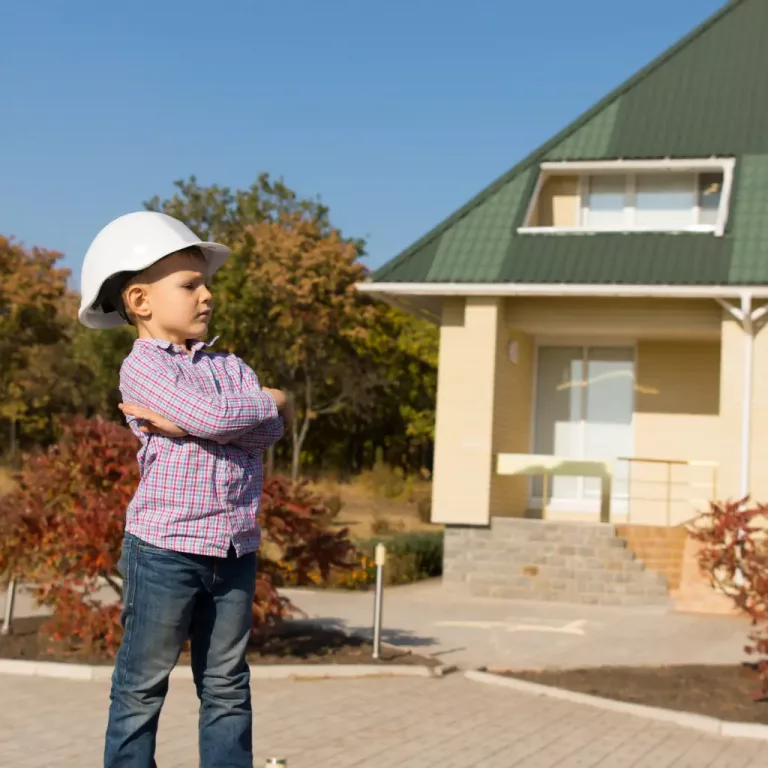
In the nurturing space of a playhouse, children feel safe to express themselves openly and boldly take on various roles. This freedom of expression is vital for emotional development.
As they navigate through different scenarios—celebrating victories, facing challenges, or even dealing with the ‘drama’ of their play—children learn to understand and manage their emotions.
They experience joy, frustration, excitement, and disappointment, all within the safe and supportive environment of play. This emotional rollercoaster is instrumental in developing resilience and emotional intelligence.
Additionally, the sense of accomplishment children feel when they contribute ideas or solve problems within their play narratives boosts their self-confidence.
They gain faith in their abilities, learn to trust their instincts, and are encouraged to take initiative. This burgeoning self-confidence is critical for their development into self-assured individuals who are comfortable in their skin and capable of facing the world with optimism and courage.
Language Development
Encouraging Language Development Through Storytelling and Role-playing
Each visit to a playhouse is akin to stepping into a new story. These narratives, born from the depths of children’s imaginations, serve as a fertile ground for language development and narrative skills.
As children engage in role-playing, they not only enact various characters but also narrate their actions and dialogues, crafting stories that are as boundless as their creativity.
This process of storytelling and role-playing is instrumental in enhancing their ability to structure sentences, use new words, and convey complex ideas, thereby nurturing their linguistic talents in a fun and engaging manner.
Benefits of Vocabulary Expansion and Language Comprehension During Play
The spontaneous dialogues and interactions within playhouses act as a natural vocabulary builder. Children are introduced to new words and phrases as they encounter different scenarios, from ordering food in their imaginary café to embarking on a space mission.
This exposure to a wide range of vocabulary in context helps deepen their understanding of language nuances and improves comprehension.
The give-and-take of conversation in play also hones their listening skills, further solidifying the foundation for effective communication.
Independence and Decision-Making
Providing a Safe Space for Children to Make Choices and Take Risks
Playhouses offer a unique environment where children are empowered to make their own decisions, from choosing the game’s rules to selecting their roles in the play.
This freedom to choose and the opportunity to take risks within a controlled and safe setting are critical for developing a sense of autonomy.
Making choices, even in play, helps children understand the consequences of their actions, teaching them about responsibility and the importance of making thoughtful decisions.
For guidance on selecting the best playhouses and toys online, explore our insider tips for toy shopping” would provide a smooth transition.
Developing Independence, Self-reliance, and Decision-making Skills Through Play
The autonomy that playhouses provide is a significant step toward fostering independence and self-reliance in children.
By navigating through various scenarios and making decisions on their own, children learn to trust their judgment and feel confident in their ability to solve problems.
This independence in play translates to greater self-assurance in their daily lives, preparing them for the various challenges they will face as they grow.
Sensory Stimulation
Providing Tactile, Auditory, and Visual Sensory Experiences
The rich sensory environment of a playhouse offers children tactile, auditory, and visual experiences that are crucial for sensory development.
Touching different textures, hearing a variety of sounds, and seeing a spectrum of colors and shapes stimulate their senses, enhancing sensory integration and processing abilities.
This stimulation is vital for developing fine motor skills, spatial awareness, and even influencing cognitive growth.
Importance of Sensory Play in Sensory Integration and Processing Skills
Sensory play within the context of a playhouse supports the development of sensory processing skills, allowing children to better understand and respond to the sensory information they receive from the world around them.
These skills are fundamental in performing complex tasks, focusing on specific stimuli amidst distractions, and navigating new environments confidently.
Cultural and Social Awareness
Incorporating Diverse Themes, Cultures, and Traditions in Playhouses
Playhouses are not just spaces for imaginative play; they are also gateways to the world. By incorporating themes, designs, and elements from different cultures and traditions, playhouses can introduce children to the rich tapestry of global diversity.
This exposure fosters an appreciation for other ways of life and encourages inclusivity and respect for cultural differences from a young age.
Teaching Children About Different Occupations, Environments, and Lifestyles
Through the versatile nature of playhouse scenarios, children explore various roles and professions, from astronauts exploring space to doctors caring for patients.
This exploration not only broadens their understanding of the world and its myriad possibilities but also nurtures empathy and a deeper understanding of the roles people play in society.
It’s a playful yet powerful way to teach children about the diversity of occupations, environments, and lifestyles, paving the way for open-mindedness and curiosity about the world.
Conclusion
In essence, playhouses are more than just child’s play; they’re foundational tools for holistic child development.
They nurture physical prowess, spark cognitive abilities, enrich social and emotional well-being, enhance language skills, promote independence, stimulate the senses, and open windows to cultural and social awareness.
As we prioritise play in our children’s lives, let’s not forget the humble playhouse—a powerhouse of developmental benefits.
To parents, educators, and all those invested in the well-being of our children: let’s give them the gift of playhouses. Because in every child who plays, there’s a future filled with potential waiting to be unlocked.
FAQs
Playhouses are beneficial for children as young as toddlers to those in early primary school, typically from ages 2 to 8. This age range is crucial for developmental milestones in physical, cognitive, social, and emotional domains. Playhouses offer varied activities that can be tailored to meet the developmental needs and interests of each age group, ensuring that children reap the maximum benefits from their play experiences.
Playhouses can be seamlessly integrated into educational settings by using them as interactive learning environments. Educators can incorporate thematic playhouses, such as mini markets, hospitals, or science labs, to complement curriculum goals in a fun and engaging way. This approach not only enhances learning outcomes but also supports the development of social skills and creativity through role-playing and collaboration among peers.
While all playhouses provide valuable developmental benefits, those that offer a variety of activities and thematic elements can be particularly enriching. Playhouses that encourage physical activity (such as climbing structures), imaginative play (like themed playhouses), and social interaction (with spaces for group play) are especially beneficial. The key is to choose playhouses that are well-suited to the child’s interests and developmental stage, as this will encourage more frequent and engaged play.
Yes, playhouses can be incredibly supportive for children with special needs. They offer a versatile and adaptable environment that can be tailored to support a wide range of developmental challenges, including sensory processing disorders, autism, and physical disabilities. Special attention to the design, such as incorporating sensory-friendly materials, ensuring accessibility, and creating quiet spaces, can make playhouses an inclusive setting where children of all abilities can play, learn, and grow together.
